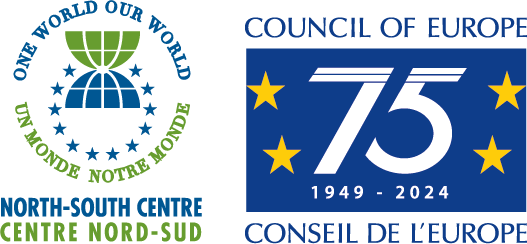Online Training Courses

Global Education
Available in Arabic, English and French

Would you like to know more about Global Education concept, methodologies, and self-learning assessment?
Global Education is a pedagogical approach that privileges a better understanding of world issues and makes the connection between local and global realities, triggering empathy and openness to other cultures, beliefs, worldviews, and practices.
Through a learner centred approach, fostering multiple perspectives and the deconstruction of stereotypes, Global Education inspires critical awareness of global challenges and engagement for sustainable lifestyles.
The North-South Centre of the Council of Europe is pleased to provide a new online self-eLearning course for all to take action towards more fair and sustainable societies and economic patterns.
This course, designed for educators and policy makers, but open to everyone, offers presentations, interactive information, videos, podcasts, reflective exercises and self-learning assessment tools divided into four thematic modules providing the knowledge and competences needed to best implement Global Education and inspire people to become active agents of global change!
 Module 1 - Initial introduction to Global Education in meaning and value.
Module 1 - Initial introduction to Global Education in meaning and value.
 Module 2 - Global Education in Practice.
Module 2 - Global Education in Practice.
 Module 3 - The Reference Framework of Competences for Democratic Culture.
Module 3 - The Reference Framework of Competences for Democratic Culture.
 Module 4 - Learning through Global Education in different contexts.
Module 4 - Learning through Global Education in different contexts.
You need to create a user account on HELP platform. Each module is estimated to be completed in 60 minutes. The finalisation of the four modules offers a certificate delivered by the Council of Europe.
Global Education and Media

The training course aims to provide new skills and competences on Global Education, Media Literacy and Digital Citizen Education.
It targets formal and non-formal young educators, youth multipliers, as well as professionals from communication sector and policymakers to:
reflect on Global Education, its concept, principles, and methodology;
explore the concept of Media Literacy, its link with Global Education and its impact on society;
develop specific competences focused on Media Literacy and Global Education for practitioners;
promote networking among participants involved in global awareness-raising or educational actions.
The conceptual and methodological framework of the course is based on the Global Education Guidelines. Following a non-formal learning approach, working methods includes different kinds of pedagogical supports, activities and exercises adapted to the participants’ needs. The main content of the course relies on the Media Literacy for Global Education – Toolkit for Youth Multipliers.
Third edition :
From 29 January to 25 Ferburay 2024
Second edition :
From 6 March to 2 April 2023
First edition :
From the 18 April to13 of 2022
Online Training Courses Reports 2016-2017
Online Training Courses Reports 2015
Online Training Courses Reports 2014
Online Training Courses Reports 2013
Online Training Courses Reports 2012
Online Training Courses Reports 2011

Theses onlines courses are supported by Ilegend: a Joint programme of the European Union and the Council of Europe: co-funded by the European Union in the Framework of DEAR Programme and the Council of Europe.

+351 213 584 030
1200-829 Lisbon - PORTUGAL


